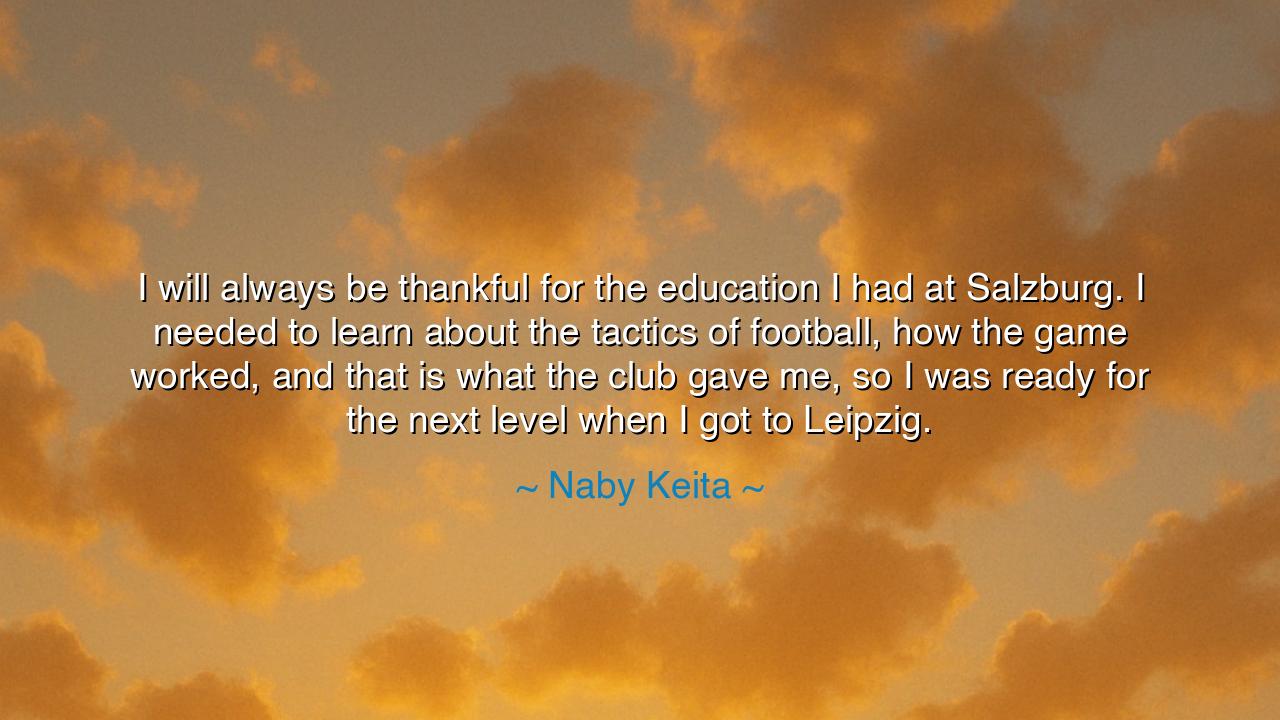
I will always be thankful for the education I had at Salzburg. I
I will always be thankful for the education I had at Salzburg. I needed to learn about the tactics of football, how the game worked, and that is what the club gave me, so I was ready for the next level when I got to Leipzig.






Hear, O seeker of wisdom, the words of Naby Keïta, who declared with humility and remembrance: “I will always be thankful for the education I had at Salzburg. I needed to learn about the tactics of football, how the game worked, and that is what the club gave me, so I was ready for the next level when I got to Leipzig.” This is no idle reflection, but the solemn acknowledgment of a man who knows that greatness is not born in a single moment, but is forged step by step through learning, discipline, and preparation.
The origin of this utterance lies in Keïta’s journey through the halls of Red Bull Salzburg, a place not only of training but of transformation. It was here that he received his education—not the shallow thrill of play, but the deeper understanding of tactics, of systems, of how the beautiful game truly works. From this foundation, he was able to ascend to Leipzig, equipped not with raw talent alone, but with the wisdom to wield it. Gratitude binds his memory to Salzburg, for he knows that without their shaping, his destiny might have remained unrealized.
This truth has been spoken in ages past. Consider the story of Alexander the Great and Aristotle. Alexander’s courage and ambition were fierce, but it was the teaching of Aristotle that tempered his vision, gave him the lens through which to see strategy, governance, and philosophy. Without that grounding, his conquests might have been chaos. Just as Alexander carried his teacher’s wisdom into battle, so too did Keïta carry the teachings of Salzburg into Leipzig, rising not as a boy of instinct alone but as a man of knowledge.
Notice also the humility in his words: “I needed to learn.” Few are willing to admit their need for instruction, for pride blinds many to their deficiencies. Yet Keïta honors the truth that raw ability is not enough—it must be disciplined, shaped, and guided. To give thanks for instruction is to admit that one has been made stronger by the hands of others. In this humility lies the root of all true greatness.
The lesson for us is clear: never despise the stages of your journey. Each school, each trial, each mentor is preparing you for a higher level yet unseen. To ignore this is to stumble unready when opportunity comes. To embrace it is to walk into the future equipped with both skill and wisdom. Keïta’s gratitude to Salzburg reminds us that preparation is not wasted time—it is the soil in which destiny grows.
Therefore, O listener, look back upon your own life and name the places that taught you, the people who trained you, the challenges that prepared you. Be thankful for them, even if they were hard, for without them you would not be ready for the next level. Carry gratitude like a shield, for it protects the heart from arrogance and reminds you always that your path is shared with many who shaped you.
So let the words of Naby Keïta endure: “I will always be thankful for the education I had.” For in them lies the eternal truth: that success is not born in the moment of triumph but in the years of preparation, in the guidance received, and in the willingness to learn. Carry this teaching into your own days, and you too shall be ready when your next level arrives, strong not only in talent, but in wisdom, humility, and gratitude.






AAdministratorAdministrator
Welcome, honored guests. Please leave a comment, we will respond soon